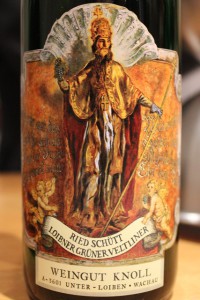Easter label?
April 20th, 2014 | Fiestas
 As Christians around the world celebrate Easter Sunday I did think about adding a picture of some decorated eggs to brighten up today’s post. Apparently the giving of eggs at Easter is supposed to symbolise the giving of new life – the resurrection if you will…. It could be said however, that this underlying meaning has since become a little lost, and that for many children at least, it has become more to do with the worship of chocolate. The symbolism of the Easter Bunny (or hare) is perhaps even more tenuous – it allegedly relates to the legend of an Anglo-Saxon goddess and a magically transformed hare that discovered it could lay eggs! Enough said.
As Christians around the world celebrate Easter Sunday I did think about adding a picture of some decorated eggs to brighten up today’s post. Apparently the giving of eggs at Easter is supposed to symbolise the giving of new life – the resurrection if you will…. It could be said however, that this underlying meaning has since become a little lost, and that for many children at least, it has become more to do with the worship of chocolate. The symbolism of the Easter Bunny (or hare) is perhaps even more tenuous – it allegedly relates to the legend of an Anglo-Saxon goddess and a magically transformed hare that discovered it could lay eggs! Enough said.
So, instead of all this, I decided to include a wine label from Austria. Weingut Knoll is located in the well-known wine region of Wachau and produces mainly white wines, predominantly Grüner Veltliner and Riesling. The wines are vinified more especially for long keeping and the winery is also highly acclaimed for its selection of sweet dessert wines (where vintages permit). Knoll wines are instantly recognisable by their very traditional labels, which it must be said, would not look out of place in the Vatican.
 As Christians around the world celebrate Easter Sunday I did think about adding a picture of some decorated eggs to brighten up today’s post. Apparently the giving of eggs at Easter is supposed to symbolise the giving of new life – the resurrection if you will…. It could be said however, that this underlying meaning has since become a little lost, and that for many children at least, it has become more to do with the worship of chocolate. The symbolism of the Easter Bunny (or hare) is perhaps even more tenuous – it allegedly relates to the legend of an Anglo-Saxon goddess and a magically transformed hare that discovered it could lay eggs! Enough said.
As Christians around the world celebrate Easter Sunday I did think about adding a picture of some decorated eggs to brighten up today’s post. Apparently the giving of eggs at Easter is supposed to symbolise the giving of new life – the resurrection if you will…. It could be said however, that this underlying meaning has since become a little lost, and that for many children at least, it has become more to do with the worship of chocolate. The symbolism of the Easter Bunny (or hare) is perhaps even more tenuous – it allegedly relates to the legend of an Anglo-Saxon goddess and a magically transformed hare that discovered it could lay eggs! Enough said.
So, instead of all this, I decided to include a wine label from Austria. Weingut Knoll is located in the well-known wine region of Wachau and produces mainly white wines, predominantly Grüner Veltliner and Riesling. The wines are vinified more especially for long keeping and the winery is also highly acclaimed for its selection of sweet dessert wines (where vintages permit). Knoll wines are instantly recognisable by their very traditional labels, which it must be said, would not look out of place in the Vatican.


